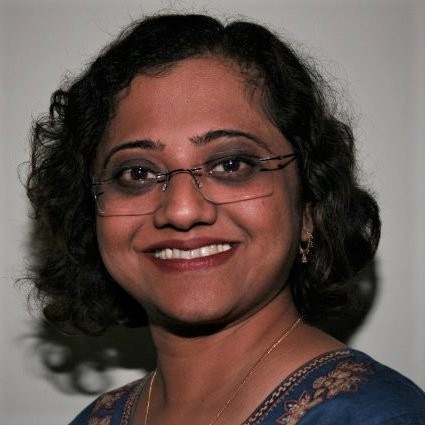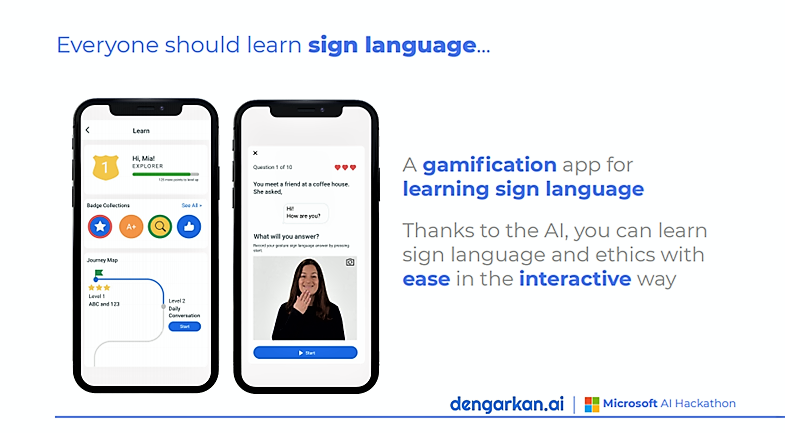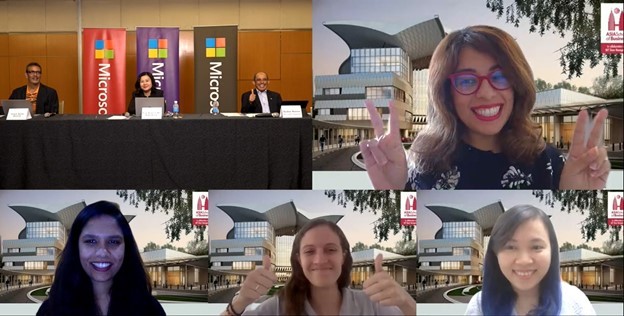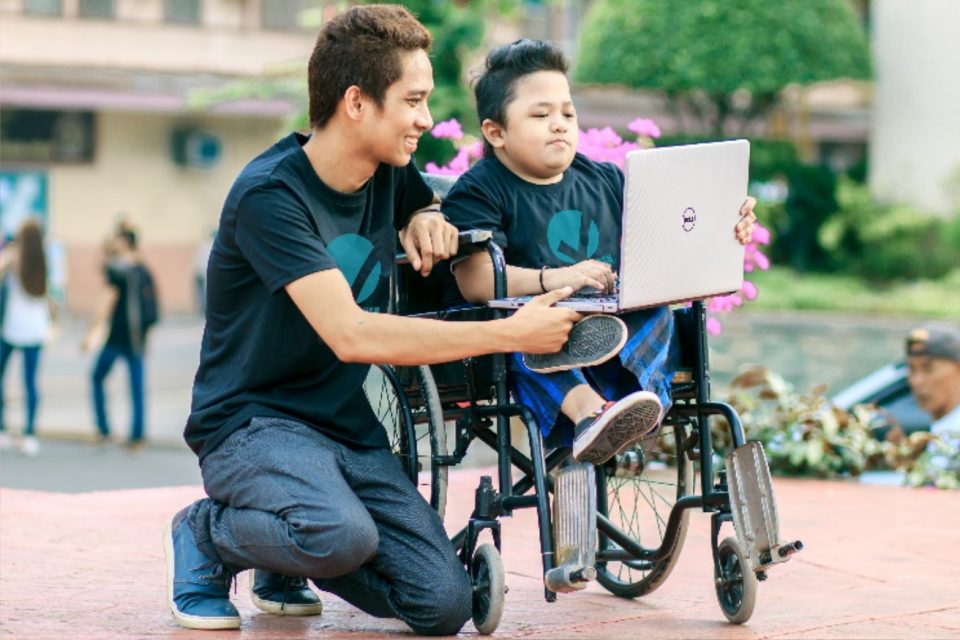Our AI for Accessibility Hackathon is held virtually for the first time across14 Asia Pacific countries.
By Pratima Amonkar, Chair for D&I and Accessibility for Microsoft APAC
 Accessibility is a journey towards a future where everyone can participate. The World Health Organization, shares that more than 1 billion people identify as having a disability (PwDs) globally, and at some point in our lives, everyone will face some form of it. Whether temporary like a fractured arm, situational like carrying an infant, or permanent. Unfortunately, only one in 10 have access to technology that can assist and enable full participation in society. In Asia Pacific (APAC), that number is 650 million.
Accessibility is a journey towards a future where everyone can participate. The World Health Organization, shares that more than 1 billion people identify as having a disability (PwDs) globally, and at some point in our lives, everyone will face some form of it. Whether temporary like a fractured arm, situational like carrying an infant, or permanent. Unfortunately, only one in 10 have access to technology that can assist and enable full participation in society. In Asia Pacific (APAC), that number is 650 million.
At Microsoft, when we look ahead, we see tremendous possibility here. We believe that we have the responsibility and opportunity to design and build technology that is inclusive and innovative. We believe that text-to-speech tools like Microsoft Narrator, voice commands and remote controls were designed for people living with disabilities, and benefit us all. In addition to the Microsoft Enable Lab, we host hackathons which have resulted in assistive solutions like Eye Control and Seeing AI.
Beyond tools, it’s crucial that we create a culture of inclusion and build the digital skills capabilities of people with disabilities. To achieve that, we launched the Microsoft Enabler Program in September 2020 with employer partners and non-profit organizations, improving the employability of people with disabilities through digital skills and corporate training, internships and job shadowing.
The AI for Accessibility hackathon is so much more than just a hackathon – it is also a springboard for us to identify and advance technologies that make the world more accessible and inclusive. The 2019 winner of the AI4A hackathon from Sri Lanka, Fortude, also received our global AI for Accessibility grant, which will enable them to further develop their Dysphagia identification app.
First virtual AI for Accessibility Hackathon in APAC
578 participants from 181 teams across 11 countries came together on one platform to create solutions for real-world problem statements posed by 12 non-profit organizations (NPOs). The seven winning teams developed innovative solutions to meet needs in the areas of employment, daily life and communication and connection.
To assist people who are hard of hearing, Team Accensible from Singapore developed an application that would run alongside video conferencing platforms and provide assistive tech such as speech-to-text, sign-to-text and a meeting minutes transcriber – an especially relevant tool in our ‘remote everything’ world of today. To build awareness on common challenges for the deaf, Team Cloud Access from Indonesia built an app with gamification features so that everyone can learn sign language using AI.
ABOVE: A prototype of Team Cloud Access’ solution dengarkan.ai.
In New Zealand, Team Nawi (Navigating Kiwi) designed a navigation assistance tool for people with low vision. Their wearable tech solution “Nawi” was equipped with haptic feedback, hazard sensors, audio feedback and camera-tracking sensors, so that users could wander hands free or with a tactile controller.
From Vietnam, we had Team YehYeh’s app “YehYeh NFC”, which houses an audio bookshelf with text-to-speech technology as well as a physical “Braille-able”, which replaces touch screen operations with YehYeh buttons, so that people can accurately tap on their desired function on touchscreens. In Thailand, Team Vulcan Coalition developed a Thai text-to-speech synthesizer.
In addition to aids, winning teams also looked at making it easier to employ people with disabilities. Team #ASBWeAllNeedToSee from Malaysia designed BlindIn.co, a job-matching platform for potential candidates to showcase skills and capabilities through videos using Azure Cognitive Services and Machine Learning.

In the Philippines, Team Lingaro looked at psychosocial disability. Their Lingaro Wellness App tracks moods through AI and data analytics and delivers basic cognitive-behavioral interventions including suggestions for meetings with medical professionals and human resource counselors.
To support their innovation, all the teams had access to more than 18 technical and non-technical workshops, coaching, support by Microsoft and our partners – LinkedIn, Datacom, and Telstra. The teams consisted of business partners, developers, start-ups and students from universities and their solutions were developed on Azure, the Microsoft cloud.
The winning teams scored $1000 cash prizes, the opportunity to work with Microsoft Technical experts to co-build their solutions on Microsoft Azure, and have their solution available on the Microsoft marketplace in June 2021. Startup winners will also have fast-tracked access to Microsoft for Startups to get the necessary support to bring their idea to life.
Teamwork = dream work
Aside from the team winners, I’d also like to congratulate the individual prize winners:
- Reganathan Palanisamy for the best community engagement as a Social Master,
- Team Azure Dragons from Indonesia for the best presentation,
- Team Accessifier from New Zealand as the most creative in their mission canvas design,
- Joey Koh for winning the most impactful hacker award
We’re also grateful to our non-profit partners, for sharing the real-life problems faced by PWDs and using them as inspiration for the hackathon teams from Malaysia, New Zealand, the Philippines, Singapore, South Korea, Sri Lanka, Thailand, and Vietnam. We’re so grateful for their continued support and enthusiasm throughout:
- Korea – Korea Differently Abled Federation
- Malaysia – Malaysia Pan-Disability Football Club
- New Zealand – Be.Lab
- New Zealand – Foundation for The Blind
- Philippines – AHA! Learning Center
- Philippines – Atriev
- Philippines – Project Inclusion
- Philippines – Virtualahan
- Singapore – SG Enable
- Sri Lanka – MJF Charitable Foundation
- Thailand – Tab Foundation
- Thailand – The Redemptorist Foundation for People with Disabilities
- United Nations Development Program
- Vietnam – Disability Research and Capacity Development
Accessibility is more than a bold thought
Technology is a powerful force for inclusion, and when created to help someone with a permanent disability, it helps those with temporary injuries or situational disabilities. Accessibility for the few, often, becomes usability for many. I’m excited to work with communities make technology accessible.
There are no limits to what people can achieve when technology reflects the diversity of everyone who uses it.





